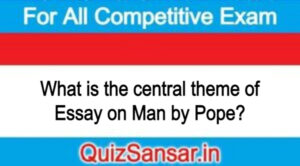
What is the central theme of Essay on Man by Pope?
What is the central theme of Essay on Man by Pope?
Or
Attempt a brief critical appreciation of the poem.
Ans.
Introduction
An Essay on Man by Pope is a profoundly philosophic poem in which, like a true classist, he has adopted a didactic and a moral tone. It has been written in the epistle form and the poet has divided it into various parts. The present piece has been taken from the second Epistle. Here Pope clearly mentions that the proper study of mankind is man, which indicates that inspite of all his wisdom and intelligence man should never try to equal himself to God, rather he should try to understand himself and his real self. He should never try to justify the ways of God. It is believed that he took the philosophy of the poem from his friend St. John Lord Bolingbroke. Here Pope thinks about man and his nature and that man can understand only with regard to his own system. He makes a satire on the scientists and the priests of his day who are always under the delusion that they are the representative of God and are in communion with Him. Pope satirises them by declaring:
Know then thyself, presume not God to scan;
The proper study of Mankind is Man.
Development of Thought
Pope has adopted a serious, thoughtful and philosophic tone since the very beginning. The central theme of the poem is man’s relation with himself and he should try to confirm the faith that there is nothing wrong with the scheme of the universe, it is quite perfect in itself and it is out of the power of man to interfere it. Satirising the thinkers and scientists of his age, Pope remarks that instead of disturbing the divine scheme, they should know the real power and capacity of man. It is impossible for man to understand it because his powers are quite limited and this effort cannot help him in anyway. Moreover, God has put man in the middle status, he is neither superior to all nor quite inferior; he acts as a link between God and animals:
Placed on this isthmus of a middle state.
A being darkly wise, and rudely great:
He is lost in a great confusion of thoughts and emotions. His knowledge is incomplete-full of darkness and doubts. He must remember that he is born to die on this earth. Man has been made in such a way as he must make mistakes and so he often takes wrong decisions in his life:
In doubt his Mind or Body to prefer,
Born but to die, and reas’ning but to err:
Man cannot easily decide which way of life he should adopt but he will have to settle it and so he commits so many mistakes in making this judgement. Sometimes he succeeds and at another time he fails. So, he himself is responsible for his glory and for his self ridicule :
Sole judge of Truth, in endless Error hurl’d:
The glory jest, and riddle of the world!
The last line indicates that man is nothing but a bundle of contradiction-glory and ridicule at the same time.
Satire and Witticism
The whole poem bears a vein of satire on the contemporary pedants-the religious philosophers and the scientists who put themselves in line with God. They consider that they are the wisest and the most powerful but in fact, they are nothing. He satirises that undoubtedly man is superior to animals but he is and will always remain inferior to God. Thus, the poem is a beautiful mixture of advise and satire. Everything has been told quite plainly and directly. Pope tries to make people understand their real position in the midst of the universe.
Style
As usual with Pope, the whole poem has been composed in perfect heroic couplets. There is restraint, clarity and beauty of form. Various images speak of the classical perfection of Pope. The declaration of the study of man means the proper understanding of the problems of everyday life and man’s effort to solve them. The rhythm is perfect and the theme has been developed quite logically.
- What is meant by Database Management System?
- Discuss the advantages and drawbacks of database.
- What do you mean by database ? Discuss its Characteristics.
- What is Data Mining?
- What are the conditions of communication?
- What do you mean by business communication ?
- organization / Differentiate between classical and modern theory of organization
- What is forecasting






